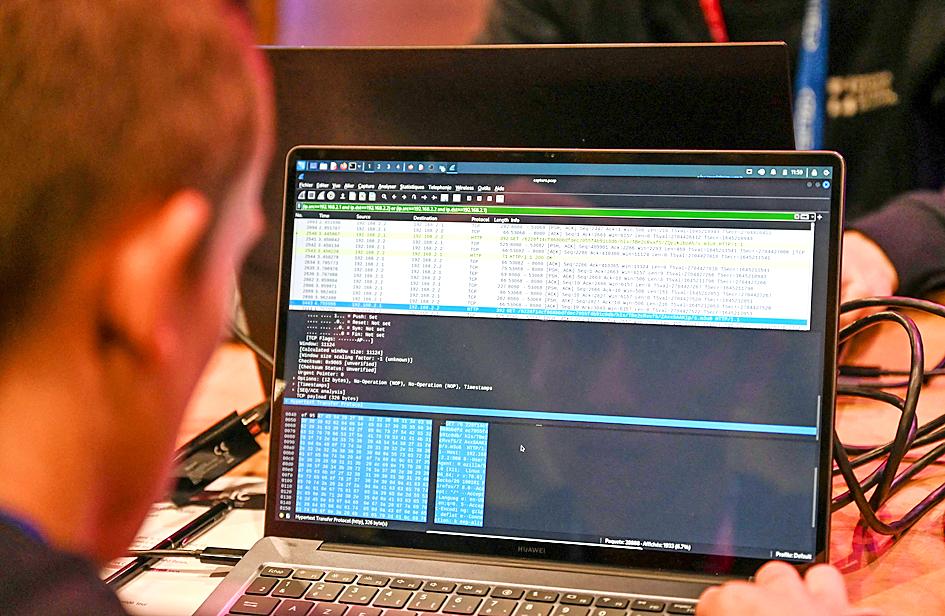Several European heads of military cyberdefense forces on Wednesday said that Russia has been far less effective than expected in employing digital combat capabilities in its offensive against Ukraine.
“Among cybersecurity experts, we were pretty sure that there would be a cyber-Pearl Harbor based on past experience of Russian behavior and capabilities,” said General Karol Molenda, head of Poland’s National Cyber Security Centre, referring to Japan’s attack on the US base in Honolulu during World War II.
However, Ukraine was prepared and “withstood attacks from Russia,” Molenda told a meeting of the International Cybersecurity Forum in Lille, France.

Photo: AFP
This shows that you can prepare for cyberconflict against Russia, which he said was “good at offensive capabilities, but not so good at defense.”
He cited multiple cyberattacks that the country had experienced, mainly the work of independent hackers.
Lithuania’s head of cybersecurity, Colonel Romualdas Petkevicius, said that Russia is “not ready to wage coordinated cyber and kinetic war.”
There are cyberactivities everywhere in Ukraine, “thousands of them, but I don’t think they are very well planned,” Petkevicius told reporters.
General Didier Tisseyre, head of France’s cyberdefense force, made a similar observation about a disconnect between computer attacks and Russia’s military offensive on the ground.
“Maybe they didn’t manage to organize it the way they wanted to” and their capacities “are not as strong as we imagine,” Tisseyre said.
However, the analysis of the conflict is complicated by the fact that independent hacker groups have entered the battle, while companies such as Microsoft and Starlink have also come to Ukraine’s aid, he said.
The current conflict in cyberspace “is like a rugby world cup, where all the teams are on the field without their distinctive jerseys,” he said.
“The public is on the field too, and you have to prevent tries from being scored,” he added.

The Burmese junta has said that detained former leader Aung San Suu Kyi is “in good health,” a day after her son said he has received little information about the 80-year-old’s condition and fears she could die without him knowing. In an interview in Tokyo earlier this week, Kim Aris said he had not heard from his mother in years and believes she is being held incommunicado in the capital, Naypyidaw. Aung San Suu Kyi, a Nobel Peace Prize laureate, was detained after a 2021 military coup that ousted her elected civilian government and sparked a civil war. She is serving a

China yesterday held a low-key memorial ceremony for the 1937 Nanjing Massacre, with Chinese President Xi Jinping (習近平) not attending, despite a diplomatic crisis between Beijing and Tokyo over Taiwan. Beijing has raged at Tokyo since Japanese Prime Minister Sanae Takaichi last month said that a hypothetical Chinese attack on Taiwan could trigger a military response from Japan. China and Japan have long sparred over their painful history. China consistently reminds its people of the 1937 Nanjing Massacre, in which it says Japanese troops killed 300,000 people in what was then its capital. A post-World War II Allied tribunal put the death toll

‘NO AMNESTY’: Tens of thousands of people joined the rally against a bill that would slash the former president’s prison term; President Lula has said he would veto the bill Tens of thousands of Brazilians on Sunday demonstrated against a bill that advanced in Congress this week that would reduce the time former president Jair Bolsonaro spends behind bars following his sentence of more than 27 years for attempting a coup. Protests took place in the capital, Brasilia, and in other major cities across the nation, including Sao Paulo, Florianopolis, Salvador and Recife. On Copacabana’s boardwalk in Rio de Janeiro, crowds composed of left-wing voters chanted “No amnesty” and “Out with Hugo Motta,” a reference to the speaker of the lower house, which approved the bill on Wednesday last week. It is

FALLEN: The nine soldiers who were killed while carrying out combat and engineering tasks in Russia were given the title of Hero of the Democratic People’s Republic of Korea North Korean leader Kim Jong-un attended a welcoming ceremony for an army engineering unit that had returned home after carrying out duties in Russia, North Korean state media KCNA reported on Saturday. In a speech carried by KCNA, Kim praised officers and soldiers of the 528th Regiment of Engineers of the Korean People’s Army (KPA) for “heroic” conduct and “mass heroism” in fulfilling orders issued by the ruling Workers’ Party of Korea during a 120-day overseas deployment. Video footage released by North Korea showed uniformed soldiers disembarking from an aircraft, Kim hugging a soldier seated in a wheelchair, and soldiers and officials